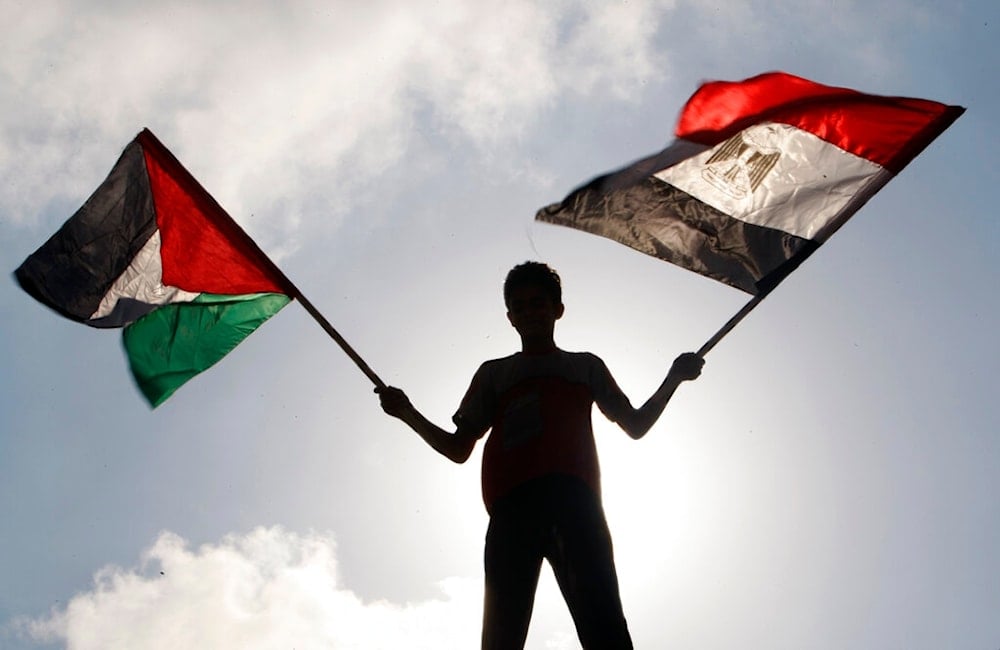Hamas, Fatah meet in Cairo to 'unite efforts, national front'
Delegations from the Hamas and Fatah movements met in Cairo to discuss the mechanisms of the committee responsible for managing border crossings, among other issues.
-

A Palestinian waves Egyptian and Palestinian flags, in Gaza City, Palestine, Aug. 6, 2012. (AP)
Hamas and Fatah held a meeting in Cairo today, Wednesday, with the aim of "unifying efforts and the national front."
The meeting took place between the Hamas delegation, led by Political Bureau member Khalil al-Hayya, and the Fatah delegation, led by its Vice President Mahmoud al-Aloul.
The media advisor to the head of Hamas’ Political Bureau stated that "these meetings aim to discuss the aggression on Gaza and the ongoing political and field developments."
The discussions focus on the mechanisms of the committee tasked with managing border crossings and issues concerning health, relief, shelter, social development, and education.
A few days ago, Palestinian Prime Minister Mohammed Mustafa revealed that the meeting in Cairo between Fatah and Hamas is aimed at "an understanding on matters that help organize the situation in Gaza."
The meeting takes place amid the ongoing genocidal war by the occupying forces in Gaza, which has lasted for a year, during which it has conducted a campaign of genocide and committed thousands of massacres.
In the past year, "Israel" killed over 41,000 Palestinians in the besieged sector, including about 17,000 children and more than 11,000 women, with around 10,000 still missing.
Additionally, more than half of Gaza's hospitals have gone out of service, and the death toll among the health sector workers has reached 986.
Satellite images show 'Israel' paving Philadelphi Corridor: BBC
Israeli occupation forces have been asphalting the key Philadelphi Corridor along Gaza's southern border, a move some analysts interpret as an indication that a full withdrawal from the territory is not imminent, BBC reported earlier in September.
This comes despite the White House saying that an Israeli-approved framework for a ceasefire deal, aimed at bridging gaps between Hamas and "Israel", includes the withdrawal of Israeli forces from all densely populated areas along the Philadelphi Corridor.
The Corridor has become a point of contention in ongoing negotiations for a ceasefire in Gaza and a prisoner exchange deal between the parties.
BBC Verify has examined satellite imagery, photos, and videos confirming the resurfacing of this road, which runs along the Gaza-Egypt border. From August 26 to September 5, satellite images captured the fresh paving of a 6.4-kilometer stretch of this road.
Read more: Exclusive - Resistance source: Philadelphi main obstacle to ceasefire
A video posted online on September 4 showed construction activity along the border fence, with heavy machinery laying new tarmac sufficient for two large vehicles to pass.
The Philadelphi Corridor includes the Rafah border crossing with Egypt, Gaza’s only crossing not under direct Israeli control and crucial for aid delivery. It extends 12.6 kilometers from the Karem Abu Salem crossing to the Mediterranean Sea.
Although "Israel" and its settlers withdrew from the Gaza Strip in 2005, the Israeli occupation military invaded the Philadelphi Corridor on May 7 of this year, deploying tanks and armored personnel carriers, and began paving the road months later. Israeli forces have also taken control of the Rafah crossing and advanced north-west along the corridor and into the southern city of Rafah.
Over the past four months, occupation forces have conducted extensive destruction operations near the corridor, including air and artillery strikes, demolitions, and bulldozer operations. For instance, the village of al-Qarya al-Suwaydiya at the Mediterranean end of the border has been destroyed and now functions as an Israeli military base.
Dr. Andreas Krieg, a senior lecturer at King’s College London, said that "paving the road puts pressure on negotiators and mediators. The Israelis are trying to create a fait accompli."
"It also suggests that Israel is not going to withdraw entirely from the Gaza strip any time soon," he told BBC.
Krieg drew parallels with the so-called Netzarim Corridor, constructed by the Israeli military earlier this year in northern Gaza, noting that such infrastructure investments suggest a long-term Israeli presence.
"If you look at the investments made in the Netzarim Corridor, it's clear they have no intention of withdrawing anytime soon, they've got concrete barriers, forward operating bases with towers and walls - you don't build those if you're planning on withdrawing," he explained.
Israeli occupation Prime Minister Benjamin Netanyahu has described the Philadelphi Corridor as crucial for Hamas' operations and insists on maintaining a military presence there as part of any agreement.
Netanyahu claims that Hamas used tunnels beneath the Philadelphi Corridor for smuggling weapons and personnel before the October 7 events.
Meanwhile, retired Egyptian Major General Dr. Samir Faraj views the road paving as a form of "psychological warfare... paving the road is a media war, a war in which Israel sends a message to different parties that they will not leave."
Read more: Crisis deepens as 400,000 people trapped in northern Gaza: UNRWA

 5 Min Read
5 Min Read








